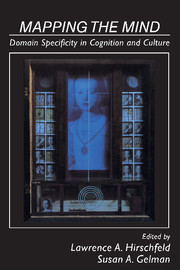Book contents
- Frontmatter
- Contents
- List of contributors
- Preface
- Part I Overview
- Part II The origins of domain knowledge: Biology and evolution
- Part III The origins of domain knowledge: Conceptual approaches
- 5 ToMM, ToBY, and Agency: Core architecture and domain specificity
- 6 Moral belief: Form versus content
- 7 Domain-specific knowledge and conceptual change
- 8 Is the acquisition of social categories based on domain-specific competence or on knowledge transfer?
- 9 The birth and nurturance of concepts by domains: The origins of concepts of living things
- Part IV Are domains theories?
- Part V Domains across cultures and languages
- Part VI Implications for education
- Author index
- Subject index
8 - Is the acquisition of social categories based on domain-specific competence or on knowledge transfer?
Published online by Cambridge University Press: 04 August 2010
- Frontmatter
- Contents
- List of contributors
- Preface
- Part I Overview
- Part II The origins of domain knowledge: Biology and evolution
- Part III The origins of domain knowledge: Conceptual approaches
- 5 ToMM, ToBY, and Agency: Core architecture and domain specificity
- 6 Moral belief: Form versus content
- 7 Domain-specific knowledge and conceptual change
- 8 Is the acquisition of social categories based on domain-specific competence or on knowledge transfer?
- 9 The birth and nurturance of concepts by domains: The origins of concepts of living things
- Part IV Are domains theories?
- Part V Domains across cultures and languages
- Part VI Implications for education
- Author index
- Subject index
Summary
The understanding of some conceptual domains is clearly helped by a domainspecific competence, as many of the chapters in this volume establish. This is the case for middle-sized objects physics (Carey & Spelke), living kind classification (Atran, Keil), theory of mind (Gopnik & Wellman, Leslie), and numerosity (R. Gelman & Brenneman). Other conceptual domains lack such an underlying domain-specific competence, including, for instance, astronomy, particle physics, computer technology, or (as the chapters by Boyer and Vosniadou suggest) religious representations and cosmology. In yet other domains the question is moot, as for instance in the case of chemistry or artifacts. The issue is quite undecided too in the domain of social categories (Turiel, 1983).
How does knowledge develop in domains for which there is no ad hoc innately specified competence? The mechanism invoked most often is analogy and transfer from better grounded domains. In particular, it has been suggested that acquisition of social categories is based on a transfer from the biological domain rather than on a domain-specific competence (Atran, 1990; Boyer, 1990; Rothbart & Taylor, 1990). In this chapter, I present evidence and arguments suggesting that the acquisition of social category does not depend on such a transfer. This could be so either because there is a domainspecific innately specified competence just for the social domain, or because social categories fall from the start within the extension of wider competences. I discuss these and other possibilities in the conclusion.
There is no well-described psychological mechanism of analogical transfer but there are lots of plausible examples. Many rich examples are found in the social sciences, in particular the history of science and anthropology.
- Type
- Chapter
- Information
- Mapping the MindDomain Specificity in Cognition and Culture, pp. 201 - 233Publisher: Cambridge University PressPrint publication year: 1994
- 26
- Cited by

